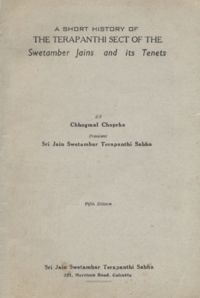The founder of the Sect Swami Bhikhanji Maharaj reinitiated himself in 1817 S. Y. after his separation from Raghunathji and formed a new order of Sadhus and began to lead the life strictly enjoined in the Sastras for Jain Sadhus.
For the guidance of the Sadhus and in order to enable them to lead a life strictly in accordance with the Sastric injunctions, he laid down several Rules of Conduct to be followed by them. As experience grew, he made strict rules. These rules or Maryadas, as they are called, were framed mostly in Samvat years 1832, 1845, 1850, 1859 and also on many other occasions and the subsequent Acharyyas explained and amplified them in the light of further experience gained. The fourth Acharyya Swami Sree Jitmalji Maharaj in Samvat year 1910 condensed all these rules or Maryadas and laid down that the said condensed Maryadas should be read every day by every Sadhu and he should put down his signature daily on the said condensed form which is technically called the "Likhat". The Maryadas are also read in public and this reading is known as Hajri or public examination of Sadhus. The daily promises, duly signed by the Sadhus all through their lives remove the possibilities of any one consenting to abide by them only under pressure. It is a voluntary promise made and renewed every day and no one but those who are determined to follow the Maryadas or strict rules of conduct could continue in this Sect. There cannot be thus any deviation from the Rules of Conduct elaborately laid down.
This would show with what strictness the Terapanthi Sadhus have to obey the rules of conduct. Thanks to the deep insight into human nature and penetrating far-sightedness of the Acharyyas, they have always discerned the weak points in human nature and whenever they have found that any strict rule is necessary to keep the Sadhus in the right path, they have not hesitated to frame it. It was in view of these fact that Dr. Jacobi remarked: -
"Sie suchen den Wandel der Mönche in genaue Ubereinstimmung mit den Vorschriften der kanonischen Schriften zu bringen und verlangen unverbrüchliche Befolgung derselben.
''They try to bring the habits and customs of the monks into exact accordance with the rules of Canonic writings (documents) and demand the unbreakable following of the same."
 Chhogmal Choprha
Chhogmal Choprha
